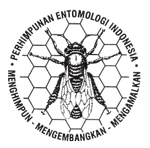Pertumbuhan dan perkembangan larva Musca domestica Linnaeus (Diptera: Muscidae) dalam beberapa jenis kotoran ternak
DOI:
https://doi.org/10.5994/jei.10.1.31Keywords:
larval survivorship, livestock manure, house flies, larvae nutrition, development timeAbstract
House fly (Musca domestica) is an important urban insect that can transmit various infectious diseases. This insect usually utilized organic wastes as nutrition source for their larvae. One of the main sources of organic wastes is livestock manure produced by animal farming located near human dwelling area. Thus, appropriate house fly population control program at animal farm is needed,based on information on the house fly's life history. The research is focused on the development of house fly larvae reared with different livestock manures, such as cow, chicken, and horse. As comparison, rice bran were used as control. Results showed that larvae reared with horse manure has the shortest development time (5 days), with lowest larval survival rate (30%), pupal weight (6.8 ± 0.141 g), and weight of female imago (4.9 ± 0.14 g). This finding indicates the lowest nutrition value of horse manure for house flies larvae. Further research is needed to find the effect of manure to variables that directly influence population growth, such as fecundity of female flies and egg survivorship. These additional information on life history will help the design of appropriate house fly population management program for animal farm.Downloads
Downloads
Published
How to Cite
Issue
Section
License
Authors who publish with this journal agree to the following terms:
- Authors retain copyright and grant the journal right of first publication with the work simultaneously licensed under a Creative Commons Attribution 4.0 International License that allows others to share the work with an acknowledgement of the work's authorship and initial publication in this journal.
- Authors are able to enter into separate, additional contractual arrangements for the non-exclusive distribution of the journal's published version of the work (e.g., post it to an institutional repository or publish it in a book), with an acknowledgement of its initial publication in this journal.
- Authors are permitted and encouraged to post their work online (e.g., in institutional repositories or on their website) prior to and during the submission process, as it can lead to productive exchanges, as well as earlier and greater citation of published work (See The Effect of Open Access).








